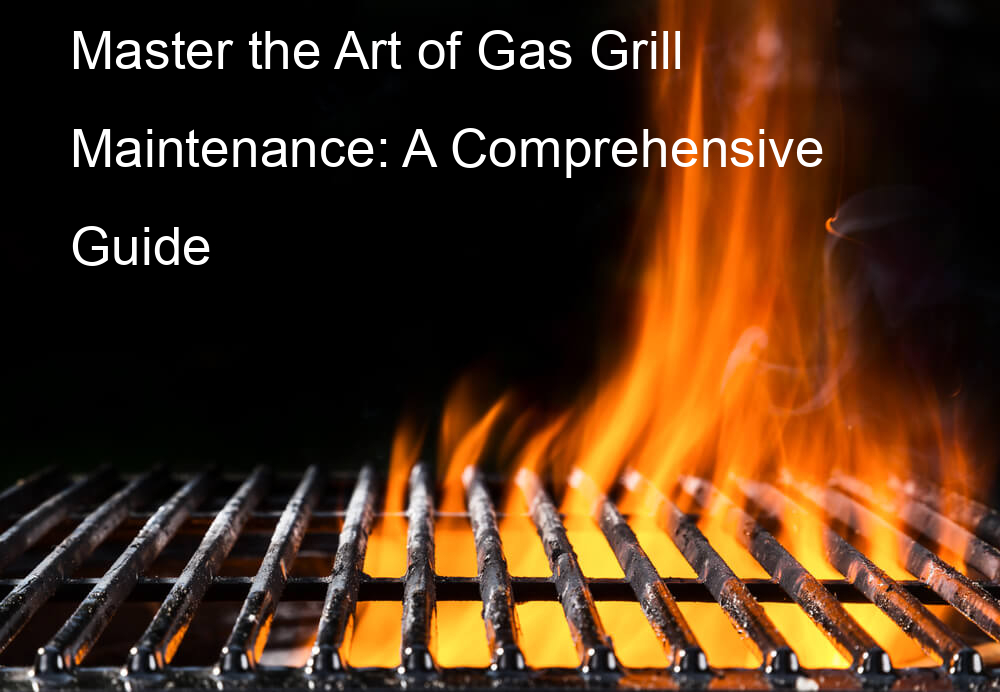Introduction to Gas Grill Maintenance
Gas grills are a fantastic addition to any outdoor cooking setup. They provide a convenient and efficient way to prepare delicious meals. However, to keep your gas grill performing at its best, it’s essential to maintain it properly. In this section, we will discuss the importance of regular gas grill maintenance, how often you should clean your grill grates, and tips on how to make your gas grill last longer.
- Importance of Regular Gas Grill Maintenance
- How Often to Clean Grill Grates
- How to Make a Gas Grill Last Longer
Regular maintenance of your gas grill is crucial for several reasons. Firstly, it ensures that your grill operates efficiently, providing consistent heat for optimal cooking results. Secondly, it prolongs the lifespan of your grill, saving you from costly replacements. Lastly, it helps to prevent potential safety hazards like gas leaks or flare-ups. According to a report by the National Fire Protection Association, failure to clean the grill was the leading factor contributing to grill fires.
Cleaning your grill grates is a key part of gas grill maintenance. It’s recommended to give your grill grates a good scrub after every use to remove food residue and prevent buildup. A deep clean, which involves removing and soaking the grates, should be done at least twice a year or more frequently if you grill often.
To make your gas grill last longer, it’s not just about cleaning and maintenance. It’s also about how you use and store your grill. Always preheat your grill before cooking to help burn off residue. After use, let it cool down completely before covering. During winter or rainy seasons, store your grill in a dry, sheltered area to protect it from the elements. According to Wikipedia, proper care and maintenance can extend the life of a gas grill by several years.
Understanding Your Gas Grill
Gas grills are a popular choice for outdoor cooking enthusiasts due to their convenience and efficiency. However, to make the most out of your gas grill, it’s essential to understand its various parts and how they work together. Here, we’ll break down the main components of a gas grill.
Parts of a Gas Grill
Let’s dive into the four main parts of a gas grill:
- Grill Grates: These are the surfaces on which you place your food for grilling. They are typically made of cast iron, stainless steel, or porcelain-coated metal. The grates absorb heat from the burners and transfer it directly to the food.
- Burners: Burners are the heart of your gas grill. They are tube-like components that emit flames when the gas is turned on. The number of burners varies depending on the size and model of the grill.
- Ignition System: This is what starts the fire in your grill. When you turn on the gas and press the ignition button, a spark is created that ignites the gas in the burners.
- Gas Supply: The gas supply system consists of the propane tank or natural gas line, regulator, and gas valves. The regulator controls the pressure of the gas, while the valves control the flow of gas to the burners.
Understanding these parts and how they function can help you operate your gas grill safely and efficiently. In the next section, we’ll explain how these parts work together to cook your food perfectly every time.
How a Gas Grill Works
Understanding how a gas grill works can help you maintain it better and enjoy more delicious barbecues. Let’s break down the process into three main steps:
- Gas supply and ignition: The first step in how a gas grill works involves the gas supply and ignition. The gas, usually propane or natural gas, is stored in a tank or connected via a supply line. When you turn on the grill, the gas flows into the burners. The ignition system, often a push-button or rotary ignitor, creates a spark. This spark ignites the gas, creating a flame. Learn more about gas supply and ignition here.
- Heat distribution: Once the gas is ignited, the heat is distributed evenly across the grill. This is done through heat diffusers or flame tamers that sit over the burners. They absorb and distribute the heat evenly across the cooking surface, ensuring your food is cooked uniformly. Find out more about heat distribution here.
- Cooking on a gas grill: Now that the grill is heated, it’s time to cook! Place your food on the grill grates. The heat from the burners cooks the food. The grill lid can be closed to trap heat for faster and more even cooking. Remember to turn your food occasionally for even cooking and to prevent burning. Discover more about cooking on a gas grill here.
Knowing how your gas grill works can help you troubleshoot issues, cook your food perfectly, and keep your grill in top shape for many barbecues to come.
Gas Grill Maintenance Near Me
Gas grills are a popular choice for many grill enthusiasts due to their convenience and ease of use. However, like any other appliance, they require regular maintenance to ensure they continue to function optimally. In this section, we will explore the benefits of professional gas grill maintenance and provide tips on how to find reliable gas grill repair and cleaning services near you.
- Benefits of Professional Gas Grill Maintenance
- How to Find a Reliable Gas Grill Repair and Cleaning Near Me
- Ask for Recommendations: Ask friends, family, or neighbors who own gas grills for their recommendations.
- Online Search: Use search engines to find services in your area. Look for companies with good reviews and ratings.
- Check Credentials: Ensure the service provider is licensed and insured. This protects you in case of any accidents during the repair or cleaning process.
- Compare Prices: Get quotes from multiple service providers to ensure you are getting a fair price.
Professional gas grill maintenance offers several benefits. Firstly, it can extend the lifespan of your grill. Professionals have the skills and knowledge to properly clean and repair your grill, preventing minor issues from becoming major problems. Secondly, regular maintenance can improve the performance of your grill, ensuring it heats evenly and efficiently. Lastly, professional maintenance can enhance the safety of your grill. Gas grills, if not properly maintained, can pose a fire risk. Professionals can identify and rectify potential safety issues.
Finding a reliable gas grill repair and cleaning service near you can be a daunting task. Here are a few tips to help you in your search:
In conclusion, professional gas grill maintenance can save you time, money, and ensure your grill is safe and functioning at its best. With a bit of research, you can find a reliable service provider in your area. Happy grilling!
DIY Gas Grill Maintenance and Cleaning
Gas grills are a popular choice for many outdoor cooking enthusiasts due to their convenience and efficiency. However, to ensure your gas grill performs at its best, regular maintenance and cleaning are essential. In this section, we will guide you through a simple, do-it-yourself process on how to clean your gas grill burners.
How to Clean Gas Grill Burners
Gas grill burners are the heart of your grill and require regular cleaning to function efficiently. The process involves three main steps: removing the burners, cleaning them, and reinstalling them. Let’s dive into each step.
- Removing the Burners
- Cleaning the Burners
- Reinstalling the Burners
Before you start, ensure the gas supply is turned off and the grill is cool. Remove the grates and heat tents or barrier above the burners. Depending on your grill model, the burners might be fastened with screws or clips. Carefully remove these and lift the burners out of the grill.
Once removed, inspect the burners for any signs of blockage. Use a grill brush to scrub off any residue on the burners. For stubborn dirt, a mixture of warm water and dish soap can be used. Ensure all the burner holes are clear. You can use a toothpick or paperclip to unclog them.
After cleaning, make sure the burners are dry before reinstalling them. Align them correctly with the gas supply tubes and secure them with the screws or clips you removed earlier. Replace the heat tents or barrier and the grates.
Cleaning your gas grill burners regularly not only prolongs the life of your grill but also enhances its performance, ensuring you get the most out of your outdoor cooking experiences. Remember, a clean grill is a happy grill!
Cleaning Gas Grill Grates
Keeping your gas grill grates clean is crucial for maintaining the taste of your food and the lifespan of your grill. Here, we will guide you through the steps of cleaning your gas grill grates.
- Preparation
- Cleaning process
- Aftercare
Before you start cleaning, ensure you have the necessary tools. You will need a grill brush, dish soap, and a bucket of warm water. Make sure your grill is cool to avoid burns. Remove the grates from the grill for a thorough cleaning.
Start by scrubbing the grates with the grill brush to remove any loose debris. Next, mix a solution of warm water and dish soap in your bucket. Soak the grates in this solution for about 15 minutes. After soaking, use the grill brush to scrub off any remaining residue. Rinse the grates thoroughly with clean water to ensure no soap is left behind.
After cleaning, dry the grates completely to prevent rusting. You can do this by placing them in the sun or wiping them down with a clean towel. Once dry, lightly coat the grates with cooking oil to protect them from rust and to make your next grilling experience smoother.
Remember, regular cleaning of your gas grill grates not only extends the life of your grill but also improves the taste of your food. Happy grilling!
General Gas Grill Care
Keeping your gas grill in top shape requires regular care and attention. Here are three essential steps to ensure your grill stays in the best possible condition:
- Regular Cleaning
- Proper Storage
- Regular Inspections
Regular cleaning is the first and most crucial step in gas grill care. It’s not just about keeping your grill looking shiny; it’s also about safety and performance. Over time, grease and food particles can build up, leading to flare-ups and uneven heating. Ideally, you should give your grill a quick clean after every use and a deep clean every few months. This involves removing the grates and burners and cleaning them separately, as well as cleaning the inside of the grill. Remember to use a grill brush or a ball of aluminum foil to scrub off any stubborn residue.
When not in use, your grill should be stored in a dry, protected area to prevent rust and deterioration. If you’re storing it outdoors, invest in a high-quality grill cover to protect it from the elements. Remember to wait until the grill is completely cool before covering it to avoid any potential fire hazards.
Regular inspections can help you spot potential problems before they become serious. Check your grill for signs of rust, cracks, or other damage. Pay special attention to the gas lines and connections – if you notice any leaks or loose parts, it’s time to call a professional. It’s also a good idea to check the color of your grill’s flame; a healthy flame should be blue with a small yellow tip. If the flame is mostly yellow or orange, it may indicate a problem with the gas flow or burners.
Advanced Gas Grill Maintenance
When it comes to gas grill maintenance, understanding the advanced techniques can make a significant difference in the lifespan and performance of your grill. Let’s delve into some tips and common mistakes to avoid.
Gas Grill Longevity
Ensuring the longevity of your gas grill is not a daunting task. It requires regular maintenance, proper cleaning, and avoiding common mistakes.
- Tips to extend the life of your gas grill
- Regular Cleaning: Cleaning your grill after every use can prevent the build-up of grease and food particles, which can cause rust and affect the grill’s performance.
- Proper Storage: When not in use, store your grill in a dry place and use a grill cover to protect it from the elements.
- Regular Inspection: Regularly inspect your grill for any signs of wear and tear. Replace any parts that are worn out or damaged.
- Proper Use: Always follow the manufacturer’s instructions for use and maintenance. Overheating or misuse can lead to damage.
- Common mistakes that shorten gas grill lifespan
- Ignoring Regular Cleaning: Neglecting to clean your grill regularly can lead to the build-up of grease and food particles, which can cause rust and damage.
- Improper Storage: Leaving your grill exposed to the elements can cause it to rust and deteriorate faster.
- Ignoring Regular Inspection: Failing to inspect your grill regularly can lead to unnoticed damage, which can worsen over time.
- Misuse: Using your grill in ways not recommended by the manufacturer can lead to damage and shorten its lifespan.
Here are some tips to help you extend the life of your gas grill:
Here are some common mistakes that can shorten the lifespan of your gas grill:
By following these tips and avoiding common mistakes, you can significantly extend the life of your gas grill and enjoy many seasons of great grilling.
Gas Grill Repair
Gas grills are a popular choice for many outdoor cooking enthusiasts due to their convenience and efficiency. However, like any appliance, they can experience issues that require repair. In this section, we will discuss the common gas grill issues, how to troubleshoot and repair them, and when it’s best to call a professional.
- Common Gas Grill Issues
- Low Flame: This could be due to a blockage in the burners or a problem with the gas tank.
- Uneven Heating: If your grill isn’t heating evenly, it might be due to blocked burner holes or a malfunctioning regulator.
- Ignition Failure: If your grill isn’t igniting, it could be a problem with the igniter or the gas flow.
- How to Troubleshoot and Repair
- Low Flame: Check for blockages in the burners and ensure the gas tank is full.
- Uneven Heating: Clean the burner holes and check the regulator.
- Ignition Failure: Check the igniter and ensure there’s proper gas flow.
- When to Call a Professional
Gas grills can encounter a variety of problems. Some of the most common include:
Understanding these common issues can help you identify what might be wrong with your grill.
Before you start any repair, make sure the gas is turned off and the grill is cool. Here are some general steps to troubleshoot and repair common gas grill issues:
Remember, safety should always be your first priority when working with gas appliances.
While some gas grill issues can be fixed at home, others require professional help. If you’ve tried troubleshooting and the problem persists, it’s time to call a professional. Additionally, if you’re not comfortable working with gas appliances or if the issue involves the gas line or tank, it’s best to leave it to the experts.
In conclusion, maintaining your gas grill can extend its lifespan and ensure it works efficiently. By understanding common issues, knowing how to troubleshoot, and recognizing when to call a professional, you can enjoy your gas grill for many years to come.
Conclusion
- Recap of Gas Grill Maintenance Importance
- Final Thoughts on Maintaining and Cleaning a Gas Grill
Maintaining your gas grill is not just about keeping it clean and shiny. It’s about ensuring its longevity, enhancing its performance, and most importantly, guaranteeing your safety. A well-maintained grill can last for years, providing you with countless delicious meals and memorable moments. On the other hand, a neglected grill can pose serious risks, including uneven cooking, flare-ups, and even gas leaks. Therefore, regular maintenance is not an option, but a necessity for every grill owner.
Maintaining and cleaning your gas grill may seem like a daunting task, but it’s actually quite simple once you get the hang of it. With the right tools and a little bit of time, you can keep your grill in top shape and enjoy the benefits it brings. Remember, a clean grill is a happy grill. So, make it a habit to clean and maintain your grill regularly. Not only will it enhance your grilling experience, but it will also save you money in the long run by extending the life of your grill.
In conclusion, gas grill maintenance is a critical aspect of grilling that should not be overlooked. It’s not just about the food you cook, but also about the tool you use. So, take care of your grill, and it will take care of you. Happy grilling!






